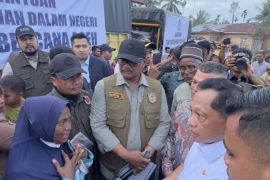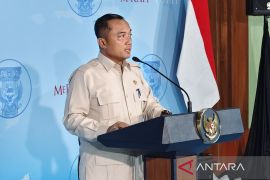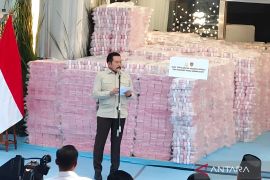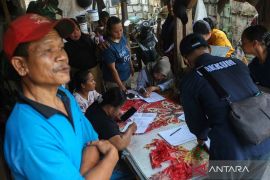There is a need for measures to eradicate illegal levies because the fraudulent practice still exists at various levels in institutions, especially those related to public services.
As a result, services to the public are increasingly becoming hampered and expensive, even as public trust in the government is declining.
Pungli still exists because it seems to be considered normal by some sections of society and is believed to make work run smoothly at several government institutions.
To address this, the government formed the Pungli task force, whose work is coordinated by the Coordinating Ministry for Political, Legal, and Security Affairs, in 2016.
The task force comprises officials from the National Police (Polri), attorney's offices, and all inspectorates of institutions, ministries, and regional governments under the Ministry of Administrative and Bureaucratic Reform (PAN-RB).
However, the formation of the task force has seemingly not addressed the issue sufficiently, so the government still needs to secure the participation of the community in monitoring illegal levies in the bureaucracy.
Considering the urgent need for eradicating illegal levies in the country, the government created an application for filing complaints called the National Public Service Complaint Management System - People's Online Aspiration and Complaint Service (SP4N LAPOR!).
Through the application, the community could submit complaints of illegal levies directly so that the authorities could take action quickly.
In 2023, 1.5 million complaints about illegal levies were filed by the community through the SP4N LAPOR! application.
According to the Coordinating Ministry for Political, Legal, and Security Affairs, the Anti-Corruption Behavior Index (IPAK) recorded a decline in 2023.
The index fell to 2.92 percent in 2023 from 3.93 percent in 2022.
To further improve the complaint service and case-handling process, the task force upgraded the SP4N LAPOR! to the Pungli Complaint Application System or Si Duli, which was launched on June 13, 2024.
The application is said to offer several advantages over the previous application in terms of the speed of the complaint-receiving system and ease of access.
The task force is hoping that these advantages will encourage people to use the application.
To create good, clean, fast, and accountable governance, all public services must be free from graft.
According to Coordinating Minister for Political, Legal, and Security Affairs, Hadi Tjahjanto, action against perpetrators of illegal levies will be taken quickly with the help of the application.
Complaints submitted to the application will be received by the task force and then verified using evidence, which will also be sent by people via the application.
Next, the task force will follow up on the complaint by visiting the location where the illegal levies were imposed and sanctioning employees who are proven to have accepted the levies.
The task force will protect the identity of complainants to ensure that the public is not hesitant or afraid to report illegal levy practices.
Head of the Pungli Task Force Commissioner General Ahmad Dofiri informed that the Si Duli application will not only help the public file complaints, but it can also be used to prevent illegal levy practices from upstream to downstream.
This can be done by recording the number of illegal levy cases received by the task force through the application. From the total number of cases, the task force will map out which agencies, ministries, and institutions have the most cases of illegal levies.
Through the application, the government can also analyze the modes used by perpetrators to collect illegal levies.
With that information, the government can mitigate illegal levies early without waiting for victims to emerge.
Furthermore, the application is also expected to become a stimulus for all ministries and other government agencies to implement the concept of digital-based services.
That concept must be applied to change behaviors in face-to-face services that open opportunities for certain parties to collect illegal levies.
Further, the Si Duli application will make the handling of illegal levies cases transparent.
The transparency will also apply to the task force, which will allow the government to map which regional task force has handled the most illegal levy cases. This is expected to motivate others to carry out their tasks to serve the public.
With the rollout of the application, the task force has high hopes that the community will participate in efforts to handle illegal levies.
The Si Duli application is expected to be used as a weapon by the community to fight illegal levies at government institutions, especially those related to public services.
Related news: Indonesian govt establishes task force to eradicate illegal levies
Related news: Indonesia Justice Ministry establishes unit to check illegal levies
Editor: Rahmad Nasution
Copyright © ANTARA 2024












